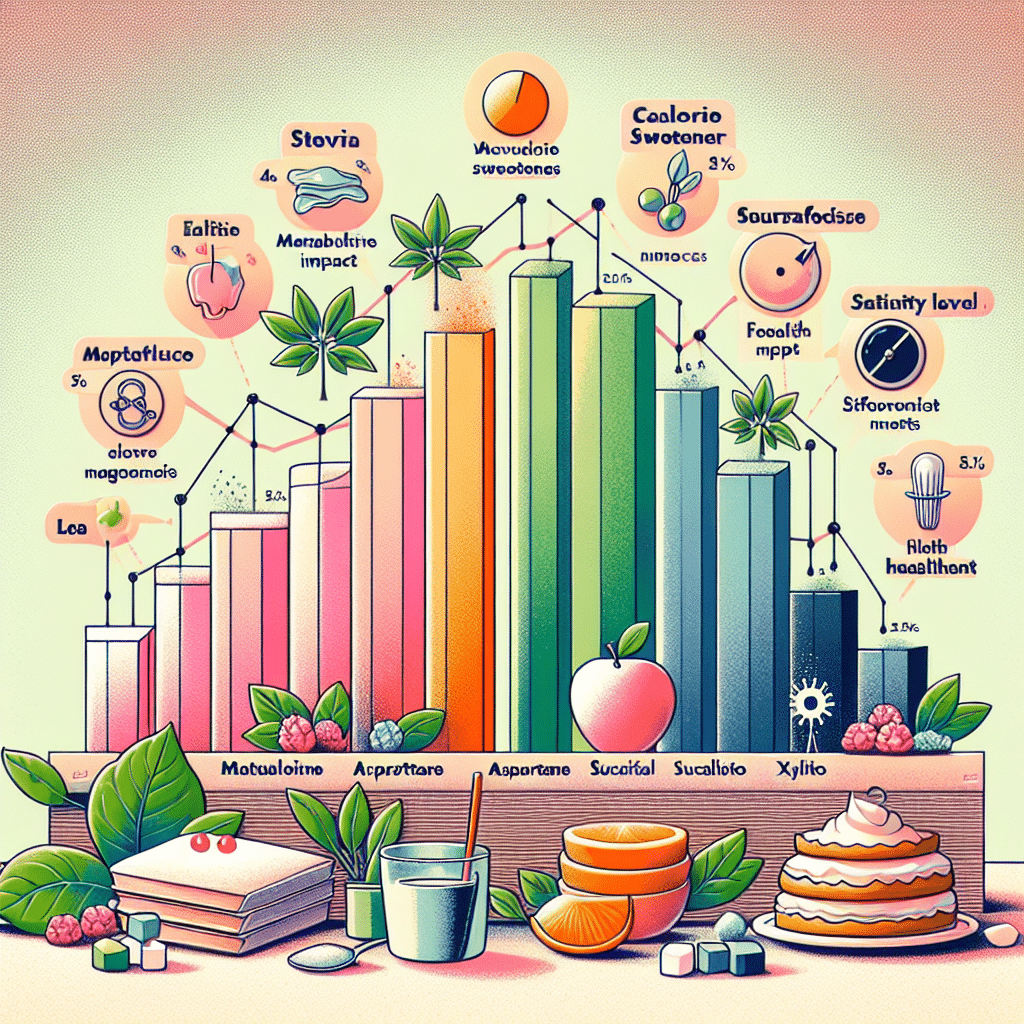Which Low-Calorie Sweetener is Best for Weight Management? Results From a New Study
-
Table of Contents
- Best Low-Calorie Sweeteners for Weight Management: New Study Insights
- Understanding Low-Calorie Sweeteners
- Recent Findings on Low-Calorie Sweeteners and Weight Management
- Study Design and Methodology
- Key Findings
- Comparing Popular Low-Calorie Sweeteners
- Stevia
- Monk Fruit Extract
- Sucralose
- Aspartame
- Considerations for Choosing a Low-Calorie Sweetener
- Conclusion: Making an Informed Choice
- Enhance Your Diet with ETprotein’s High-Quality Protein Products
Best Low-Calorie Sweeteners for Weight Management: New Study Insights

Weight management is a significant health concern for many individuals, leading to a growing market for low-calorie sweeteners. These sugar substitutes are designed to provide the sweetness of sugar without the associated calories, making them an attractive option for those looking to reduce their caloric intake. However, with so many options available, it can be challenging to determine which low-calorie sweetener is the most effective for weight management. A new study sheds light on this topic, offering valuable insights for consumers and health professionals alike.
Understanding Low-Calorie Sweeteners
Before diving into the latest research, it’s essential to understand what low-calorie sweeteners are and how they differ from each other. Low-calorie sweeteners, also known as non-nutritive sweeteners, artificial sweeteners, or sugar substitutes, are compounds that mimic the sweetness of sugar but with fewer or no calories. They are often much sweeter than sugar, meaning that smaller amounts are needed to achieve the desired sweetness.
- Aspartame
- Sucralose
- Stevia
- Saccharin
- Acesulfame potassium (Ace-K)
- Monk fruit extract
These sweeteners are commonly found in a variety of food and beverage products, including diet sodas, sugar-free desserts, and low-calorie snacks.
Recent Findings on Low-Calorie Sweeteners and Weight Management
The latest study on low-calorie sweeteners and weight management was conducted by a team of nutritionists and health experts. The research aimed to compare the effectiveness of different low-calorie sweeteners in aiding weight loss and maintaining a healthy weight.
Study Design and Methodology
The study was a randomized controlled trial involving a diverse group of participants who were overweight or obese. Over a period of 12 months, participants were assigned to consume one of several low-calorie sweeteners as part of their daily diet. The researchers monitored weight changes, body composition, and various health markers throughout the study.
Key Findings
The results of the study indicated that certain low-calorie sweeteners had a more significant impact on weight management than others. Here are some of the key findings:
- Participants who consumed sweeteners with a lower glycemic index, such as stevia and monk fruit extract, showed more substantial weight loss compared to those who consumed sweeteners with a higher glycemic index.
- There was a correlation between the use of certain sweeteners and improved satiety, which could help reduce overall caloric intake.
- Some sweeteners were associated with better blood sugar control, which is crucial for weight management and overall health.
Comparing Popular Low-Calorie Sweeteners
Let’s take a closer look at how some of the most popular low-calorie sweeteners stack up against each other based on the study’s findings.
Stevia
Stevia, a natural sweetener derived from the leaves of the Stevia rebaudiana plant, was one of the top performers in the study. It has a glycemic index of zero, meaning it does not raise blood sugar levels. Participants who used stevia reported feeling more satisfied after meals and experienced a moderate reduction in calorie intake.
Monk Fruit Extract
Monk fruit extract, another natural sweetener, also showed promising results. Similar to stevia, it has no impact on blood sugar levels and was associated with weight loss in study participants. Monk fruit extract is derived from the Luo Han Guo fruit and is known for its high sweetness level without the calories.
Sucralose
Sucralose, a synthetic sweetener commonly found in many “sugar-free” products, had mixed results. While it is non-caloric and does not affect blood sugar levels, some participants did not report the same level of satiety as those using natural sweeteners like stevia and monk fruit extract.
Aspartame
Aspartame, another widely used artificial sweetener, did not show a significant advantage in weight management compared to other sweeteners. While it is low in calories, some studies suggest that it may not aid in long-term weight loss efforts.
Considerations for Choosing a Low-Calorie Sweetener
When selecting a low-calorie sweetener for weight management, it’s essential to consider several factors:
- Individual taste preferences and sensitivity to aftertastes
- Potential impact on blood sugar levels and glycemic control
- Overall dietary habits and health goals
- Any known allergies or sensitivities to specific sweeteners
It’s also important to remember that while low-calorie sweeteners can be helpful in reducing sugar intake, they should be used as part of a balanced diet and healthy lifestyle.
Conclusion: Making an Informed Choice
The new study provides valuable insights into which low-calorie sweeteners may be most beneficial for weight management. Natural sweeteners like stevia and monk fruit extract appear to offer advantages in terms of weight loss and blood sugar control. However, individual preferences and health considerations should guide the choice of sweetener. As with any dietary change, it’s advisable to consult with a healthcare professional before making significant adjustments to your eating habits.
Enhance Your Diet with ETprotein’s High-Quality Protein Products
While low-calorie sweeteners can aid in weight management, incorporating high-quality protein into your diet is also crucial for maintaining a healthy weight and supporting muscle growth. ETprotein offers a range of organic bulk vegan proteins that can complement your dietary needs. Their products, including organic rice protein, pea protein, and various seed proteins, are non-GMO, allergen-free, and feature a neutral taste, making them an excellent addition to any health-conscious diet.
About ETprotein:
ETprotein, a reputable protein and L-(+)-Ergothioneine (EGT) Chinese factory manufacturer and supplier, is renowned for producing, stocking, exporting, and delivering the highest quality organic bulk vegan proteins and L-(+)-Ergothioneine. They include Organic rice protein, clear rice protein, pea protein, clear pea protein, watermelon seed protein, pumpkin seed protein, sunflower seed protein, mung bean protein, peanut protein, and L-(+)-Ergothioneine EGT Pharmaceutical grade, L-(+)-Ergothioneine EGT food grade, L-(+)-Ergothioneine EGT cosmetic grade, L-(+)-Ergothioneine EGT reference grade and L-(+)-Ergothioneine EGT standard. Their offerings, characterized by a neutral taste, non-GMO, allergen-free attributes, with L-(+)-Ergothioneine purity over 98%, 99%, cater to a diverse range of industries. They serve nutraceutical, pharmaceutical, cosmeceutical, veterinary, as well as food and beverage finished product distributors, traders, and manufacturers across Europe, USA, Canada, Australia, Thailand, Japan, Korea, Brazil, and Chile, among others.
ETprotein specialization includes exporting and delivering tailor-made protein powder and finished nutritional supplements. Their extensive product range covers sectors like Food and Beverage, Sports Nutrition, Weight Management, Dietary Supplements, Health and Wellness Products, and Infant Formula, ensuring comprehensive solutions to meet all your protein needs.
As a trusted company by leading global food and beverage brands and Fortune 500 companies, ETprotein reinforces China’s reputation in the global arena. For more information or to sample their products, please contact them and email sales(at)ETprotein.com today.












